
ICAS Bulletin (online ISSN 2836-3418, print ISSN 2836-340X) is published every other week throughout the year at 1919 M St NW, Suite 310, Washington, DC 20036.
The online version of ICAS Bulletin can be found at chinaus-icas.org/bulletins/.

– Taiwan has begun talks with the U.S. Department of Defense to receive US$500 million in free weapons, according to Taiwanese Defense Minister Chiu Kuo-cheng.
– The United States and the Philippines have jointly issued new guidelines which address “bilateral defense guidelines” around possible South China Sea attacks.
– At a daily press briefing, in response to a question on the renewed U.S.-Philippine security alliance, Chinese ministry spokesperson Mao Ning said the South China Sea “should not be a hunting ground for external forces.”
– U.S. defense contractors and a senior leader from the U.S. Marine Corp pledged together to have deeper cooperation with Taiwan and “be part of the self-defense capabilities of Taiwan.” The joint pledge comes as Taiwanese defense contractor Aerospace Industrial Development Corp. seeks a partnership with the U.S. to produce a fighter jet.
– The United States has committed to assisting the Philippines in resupplying a grounded naval ship in the South China Sea, in attempts to circumvent the Chinese prevention of resupplying the ship.
– Chinese officials have pushed against U.S. goals of creating a bilateral “hotline” to increase communication in crisis situations, as they provide the U.S. with “cover” for possible operations within the South China Sea and around Taiwan.
– Chinese foreign ministry spokeswoman Mao Ning stated that China firmly opposes deployment of nuclear submarines to South Korea, explaining that doing so is putting “regional security at risk.”
Associated News References:
“US and Taiwan in talks for US$500 million in free weapons after arms deliveries stalled,” South China Morning Post, May 8 [Paywall]
“US issues guidelines on defending Philippines from South China Sea attack,” Channel News Asia, May 4
“China says South China Sea should not be ‘hunting ground’ for foreign forces,” Reuters, May 4
“US defense contractors want deeper cooperation with Taiwan,” AP News, May 3
“Taiwan seeking US cooperation to make next-generation fighters,” Reuters, May 3
“U.S. ‘ready’ to aid Philippine resupplies in South China Sea: admiral,” Nikkei Asia, May 1 [Paywall]
“China Balks at U.S. Push for Better Communications During Crises,” The Wall Street Journal, April 30 [Paywall]
“China denounces US plans to send nuclear ballistic submarine to South Korea,” South China Morning Post, April 27 [Paywall]

– Artificial intelligence (AI) researchers have become concerned that the competition between the U.S. and China to rapidly develop AI softwares could lead the rest of the world behind and unable to compete.
– U.S. sanctions on Chinese technology companies have encouraged accelerated AI research, based on techniques to avoid using American microchips and semiconductors.
– Chinese technology company Pinduoduo has moved its headquarters from Shanghai, China to Dublin, Ireland, in a move which analysts suggested arises from U.S. scrutiny on Chinese-based tech firms.
– U.S. senators are considering new legislation that would give the Biden administration more power in limiting the video sharing app TikTok, alongside a bipartisan bill to enhance U.S. economic competition with China and respond to Chinese aggression towards Taiwan.
– Chinese technology company Huawei has developed a system to replace U.S. sanction-blocked ERP (enterprise resource planning) programs which had significantly limited international expansion. Despite the development of this new system, Huawei still faced flat revenue growth for the first quarter of 2023, with a marginal growth rate of 0.8% from last year.
– G-7 nation science ministers are anticipated to create an agreement on funding sources, which would define inappropriate influence on scientific research and address circulation of research while protecting national security.
– U.S. Secretary of Commerce Gina Raimondo stated that Chinese technology companies like Huawei and Alibaba may pose a security threat towards the United States, and promised to review requests to add them to export control lists.
Associated News References:
“AI Researchers Worry the U.S. and China Will Leave Everyone Else Behind,” The Wall Street Journal, May 8 [Paywall]
“U.S. Sanctions Drive Chinese Firms to Advance AI Without Latest Chips,” The Wall Street Journal, May 7 [Paywall]
“Pinduoduo owner moves headquarters to Ireland amid US-China tensions,” Financial Times, May 4 [Paywall]
“Senators will look at legislation addressing TikTok in China proposal, Schumer says,” Reuters, May 3
“Senate Democrats Plan Bipartisan Bill to Compete With China,” Bloomberg, May 3 [Paywall]
“‘We have survived!’: China’s Huawei goes local in response to US sanctions,” Financial Times, May 2 [Paywall]
“Tech war: Huawei Q1 revenue stagnates as tech giant struggles to counter US sanctions,” South China Morning Post, April 28
“G-7 science ministers to push for research funding transparency,” Nikkei Asia, April 28 [Paywall]
“US official says Chinese cloud companies like Huawei could pose threat,” Reuters, April 26
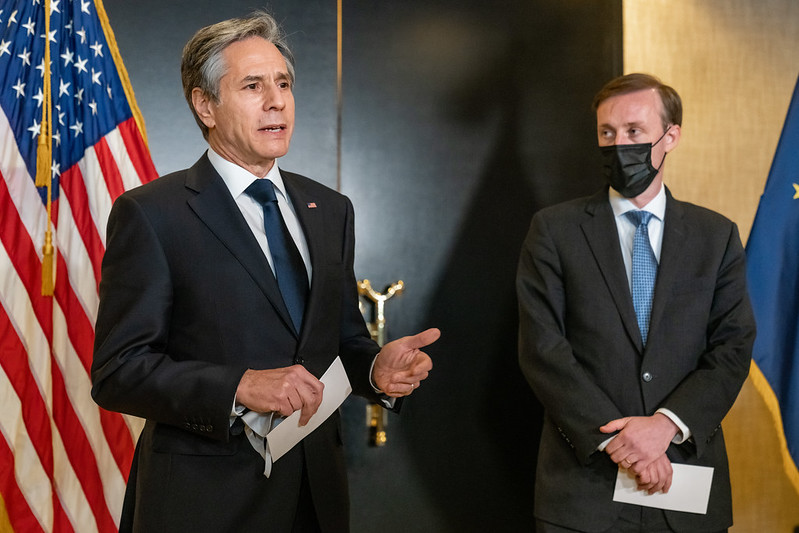
– Chinese international students in the U.S. have begun to fear that content created while studying abroad may go against the updated Chinese counterespionage law, which goes into effect in July.
– The governor of Florida, Ron Desantis, passed sweeping legislation that limits Chinese citizens from purchasing land in the state, prohibits the use of TikTok on government or school servers, and bans colleges and universities from accepting donations or gifts from “foreign countries of concern” which includes China.
– Chinese Foreign Minister Qin Gang told the U.S. to “reflect deeply” upon bilateral ties before they can return back to a healthy path, arguing that Washington was responsible for the rise in tensions.
– Tsai Ming-yen, the director-general of Taiwan’s National Security Bureau, stated that Chinese President Xi “doesn’t allow any kind of different voice in the Chinese political system,” explaining that this approach increases the “risk of making a wrong decision” on Taiwan.
– John Podesta, Senior Advisor to President Joe Biden for clean energy innovation and implementation, told the Biden Administration that the U.S. is vulnerable to a “lock” on critical mineral processing from China.
– U.S. Ambassador to China Nicholas Burns expressed the desire to “see from China much more tough-minded” stances on the Russian-Ukrainian war, clarifying that the U.S. desires China to “push Russia to remove its troops.”
– The Biden administration has decided to remain silent on Indian democratic backsliding and severe challenges to human rights, as competition with China increases the strategic need for U.S.-India cooperation.
– Leaked U.S. intelligence documents have shown that “key nations” such as India, Brazil, Pakistan and Egypt are determined to avoid the ongoing U.S.-China strategic competition.
– U.S. National Security Advisor Jake Sullivan argued that U.S. subsidies for domestic clean-energy technology will help rather than hurt U.S. international partnerships as the strategy will “build a fairer, more durable international economic order.”
– The Chinese Foreign Ministry has warned the U.S. that “China will resolutely take countermeasures” if the U.S. continues to pursue criminal cases against Chinese officers accused of targeting political dissidents within the U.S.
Associated News References:
“China tells US to ‘reflect deeply’ over downturn in ties,” AP News, May 9
“Florida’s Ron DeSantis signs bills limiting Chinese land ownership, TikTok at schools,” South China Morning Post, May 9 [Paywall]
“Chinese students in U.S. wary of going home under new spy law,” Nikkei Asia, May 6 [Paywall]
“Taiwan’s Spy Chief Says ‘Five Eyes’ Helping to Grasp Xi’s Motives,” Bloomberg, May 4 [Paywall]
“US Is Vulnerable to China’s Lock on Key Minerals, Biden Aide Says,” Bloomberg, May 3 [Paywall]
“Beijing Warned Against Sending Russia Lethal Aid for Ukraine War, Says U.S. Ambassador to China,” USNI News, May 2
“US Looks Past India’s Rights Record as China Worries Deepen,” Bloomberg, May 2 [Paywall]
“Key nations sit out U.S. standoff with Russia, China, leaks show,” The Washington Post, April 29 [Paywall]
“Top Biden Aide Says U.S. Subsidies Will Help, Not Hurt, Relationships With Allies,” The Wall Street Journal, April 27 [Paywall]
“China vows to retaliate if US continues case against police officers accused of targeting dissidents in America,” South China Morning Post, April 27 [Paywall]
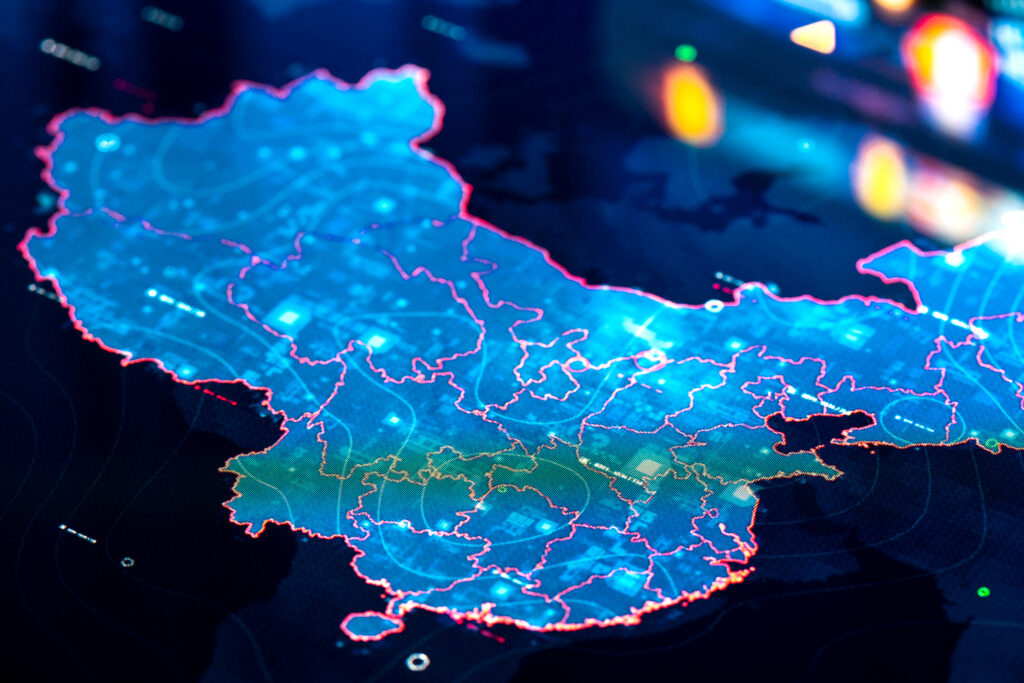
– Foreign enterprises in China are concerned about the Communist Party’s increasing emphasis on information scrutiny, which implies questioning these firms.
– LinkedIn announced it will cut 700+ jobs and discontinue its China app, following other technology companies in workforce reductions due to the weakening global economic outlook.
– The Chinese authority’s recent challenge to American consulting firm Bain & Co. have led foreign firms to worry about complying with U.S. sanction requirements and the risk of conducting local business.
– FedEx is relocating its Asia headquarters and executives from Hong Kong to Singapore while retaining its office and most staff amid U.S.-China tensions and trade slowdown.
– Despite the escalating U.S.-China tensions, the president of the Chinese-initiated Asian Infrastructure Investment Bank (AIIB) asserts that the bank maintains strong cooperation with American institutions, businesses, and the U.S. Treasury Department. AIIB also called on regional countries to fight for protectionism amidst the ongoing U.S.-China tensions.
– Bipartisan U.S. lawmakers have urged the U.S. Securities and Exchange Commission (SEC) to pause the Chinese fast-fashion company Shein’s initial public offering (IPO), or stock launch, until the absence of Uyghur forced labor is verified through an independent audit.
– Hong Kong criticized the U.S. for its ‘Made in China’ export rule after a World Trade Organization (WTO) forum Geneva meeting, accusing it of undermining WTO’s rules-based trading system, while the U.S. stalls judge appointments to the panel.
– Europe is adopting a tougher stance on China, seemingly aligning more with U.S. policies, as concerns over China’s alliance with Russia and domestic repression prompt increased export and investment controls.
– Airline disputes complicate U.S.-China relations as American carriers lobby against Chinese rivals who are seeking more flights between countries.
– In a recent speech, U.S. National Security Advisor Jake Sullivan clarified that the U.S. aims to “de-risk” rather than decouple from China, emphasizing the importance of resilient supply chains and domestic spending for competition.
– Chinese authorities questioned U.S. consulting company Bain & Co.’s Shanghai staff, reflecting Beijing’s increasing pressure on foreign firms operating in the country.
Associated News References:
“Even as China Reopens, Security Visits Spook Foreign Businesses,” The New York Times, May 8 [Paywall]
“LinkedIn cuts over 700 jobs, phases out China app as demand wavers,” Reuters, May 8
“U.S. Companies in China Worry Due Diligence Will End in Spy Dramas,” The Wall Street Journal, May 5 [Paywall]
“FedEx Plans to Move Asia Headquarters, Executives to Singapore From Hong Kong,” Bloomberg, May 4 [Paywall]
“Tracking the impact of U.S.-China tensions on global financial institutions,” NPR, May 1
“US lawmakers push SEC to order audit of Shein IPO over Uyghur forced labor fears,” Reuters, May 1
“Asian Development Bank calls on countries to fight protectionism as US-China ties sour,” Financial Times, April 30 [Paywall]
“Hong Kong hits out at US over ‘Made in China’ rule for exports after meeting in Geneva,” South China Morning Post, April 29 [Paywall]
“Europe takes tougher stance toward China in boost to U.S. policy,” Japan Times, April 29 [Paywall]
“Airlines dispute adds headwinds to US-China relationship,” Financial Times, April 29 [Paywall]
“US Wants to ‘De-Risk,’ Not Decouple, From China, Biden Aide Says,” Bloomberg, April 27 [Paywall]
“Chinese Authorities Question Staff at Bain’s Shanghai Office,” Bloomberg, April 27 [Paywall]
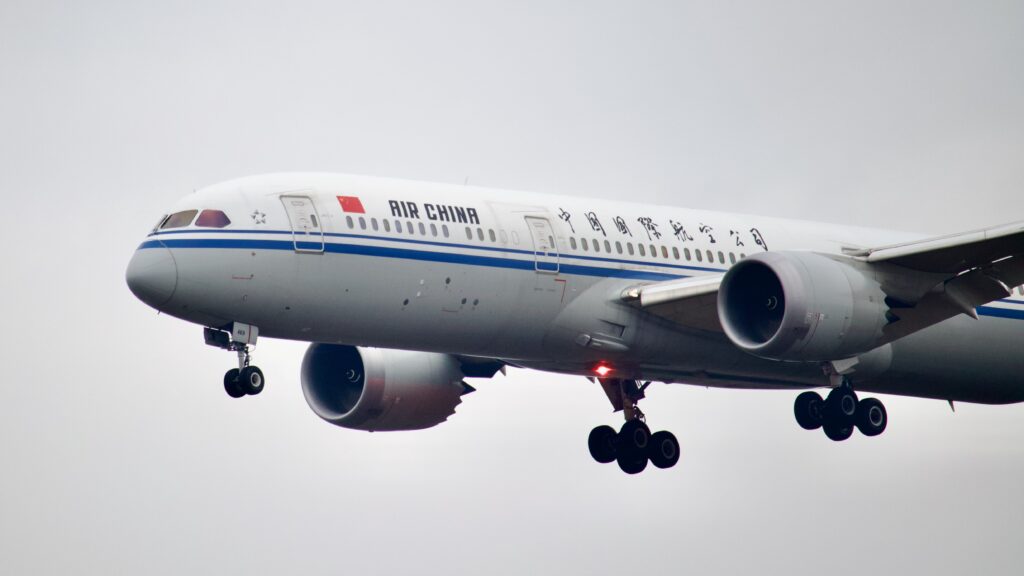
– U.S. Secretary of State Antony Blinken plans to make a trip to China in 2023 with a goal of recreating “regular lines of communication at all levels and across our government.”
– The U.S. Department of Defense is looking to schedule a meeting between Secretary of Defense Lloyd Austin and his Chinese counterpart, which is to be held in Singapore as early as June.
– The U.S. Department of Transportation has decided to allow Chinese commercial airlines to increase weekly flights allowances to 12 round trip flights each week, matching the number China allows for U.S. carriers.
– John Kerry, the U.S. climate envoy, was invited by the Chinese government to visit in “the near term” to discuss strategies to fight climate change.
– U.S. Ambassador to China, Nicholas Burns, stated that the U.S. is “ready to talk” with hopes that “the Chinese will meet us halfway.”
– Chinese President Xi and Ukrainian President Zelensky had a joint call to discuss possible cooperation to establish a just and sustainable peace for Ukraine,” amid rising international pressure from the U.S. and allies for China to take a concrete stance on the war in Ukraine.
Associated News References:
“Blinken hints at China trip this year to restart regular dialogue,” Nikkei Asia, May 4 [Paywall]
“US Seeks Meeting With China Defense Minister After Being Spurned,” Bloomberg, May 4 [Paywall]
“US OKs expansion of China flights in rare thaw between sides” Al Jazeera, May 4
“US climate envoy Kerry says China has invited him for talks,” Reuters, May 3
“The U.S. warms to a role for China in resolving the Ukraine war,” The Washington Post, May 3 [Paywall]
“U.S. ambassador to China says the U.S. is ready for high-level talks with Chinese,” NBC News, May 2
“China’s Xi calls Ukraine’s Zelenskyy, after weeks of intensifying pressure to do so,” NPR, April 26
“U.S. Think Tank Reports Prompted Beijing to Put a Lid on Chinese Data,” The Wall Street Journal, May 7 [Paywall]
“Award-winning Chinese mathematician Sun Xin returns from US to work at Peking University,” South China Morning Post, May 3 [Paywall]
“China-U.S. Fight for Influence Runs Through Police in Pacific,” The Wall Street Journal, May 3 [Paywall]
“China will be kept out of Comprehensive and Progressive Trans-Pacific Partnership, US senator predicts,” South China Morning Post, May 3 [Paywall]
“U.S.-China war would be ‘disastrous for us all,’ Singapore’s defense minister warns,” The Japan Times, May 3 [Paywall]
“EU, US warn Malaysia of security risk in Huawei’s bid for 5G role, Financial Times reports,” Reuters, May 2
“The most popular app in the U.S. deleted mentions of its Chinese owner,” The Washington Post, May 2 [Paywall]
“Mercedes-Benz chief says cutting China ties would be ‘unthinkable’,” Financial Times, April 30 [Paywall]
“‘Bring Ya Ya home’: How a panda in the US turbocharged Chinese nationalist sentiment,” CNN, April 27
May 4 hosted by Foreign Policy
May 4 hosted by Center for Strategic and International Studies
May 4 hosted by U.S.-China Economic and Security Review Commission
May 2 hosted by Stimson Center
May 1 hosted by Brookings
April 27 hosted by Harvard University Fairbank Center for Chinese Studies
April 26 hosted by U.S.-China Business Council
May 10 hosted by Peterson Institute for International Economics
May 11 hosted by Carnegie Endowment for International Peace
May 12 hosted by Center for Strategic and International Studies
May 12 hosted by Foreign Policy
May 16 hosted by Center for Strategic and International Studies
May 22 hosted by Wilson Center
May 23 hosted by National Committee on U.S. China Relations
Digital Trade and the Indo-Pacific Economic Framework (IPEF):
New Rules, New Opportunities, New Challenges
Wednesday, May 10, 2023
10:00am – 11:20am EDT
IPEF negotiators are known to be eyeing a partial accord by late-May when their trade ministers meet on the sidelines of the APEC Ministerial meeting in Detroit. Digital trade rules are an important component of the IPEF negotiations. President Biden’s U.S. Trade Representative says she is committed to building trust and promoting confidence in the digital economy, while recognizing the need to address legitimate public policy objectives in the digital trade area. The deference to policy space is a bow to the dynamic and fast-changing pace of regulation in the digital sphere—be in terms of anti-monopoly protections, privacy and data protections, fintech-related financial stability risk management, review of liability protection for intermediary service providers, development of rules for artificial intelligence (AI) applications or requiring the transparency of the structure, use, and impacts of algorithmic systems. On the other side of the Pacific meantime, an accession working group has been formed to consider China’s application to join the Digital Economy Partnership Agreement (DEPA).
What is the state of play on IPEF’s digital trade text as well as China’s DEPA accession talks? What are the commercial and regulatory challenges encountered by private businesses as they navigate their way within the Asia-Pacific region’s dynamic digital marketplace? What are the key challenges facing the governance of cross-border data flows at the global level? And how do digital economy chapters and agreements differ in their focus and impact from traditional trade agreements? To listen to these and other answers to pressing digital trade and IPEF-related questions, tune in to the event on May 10th.
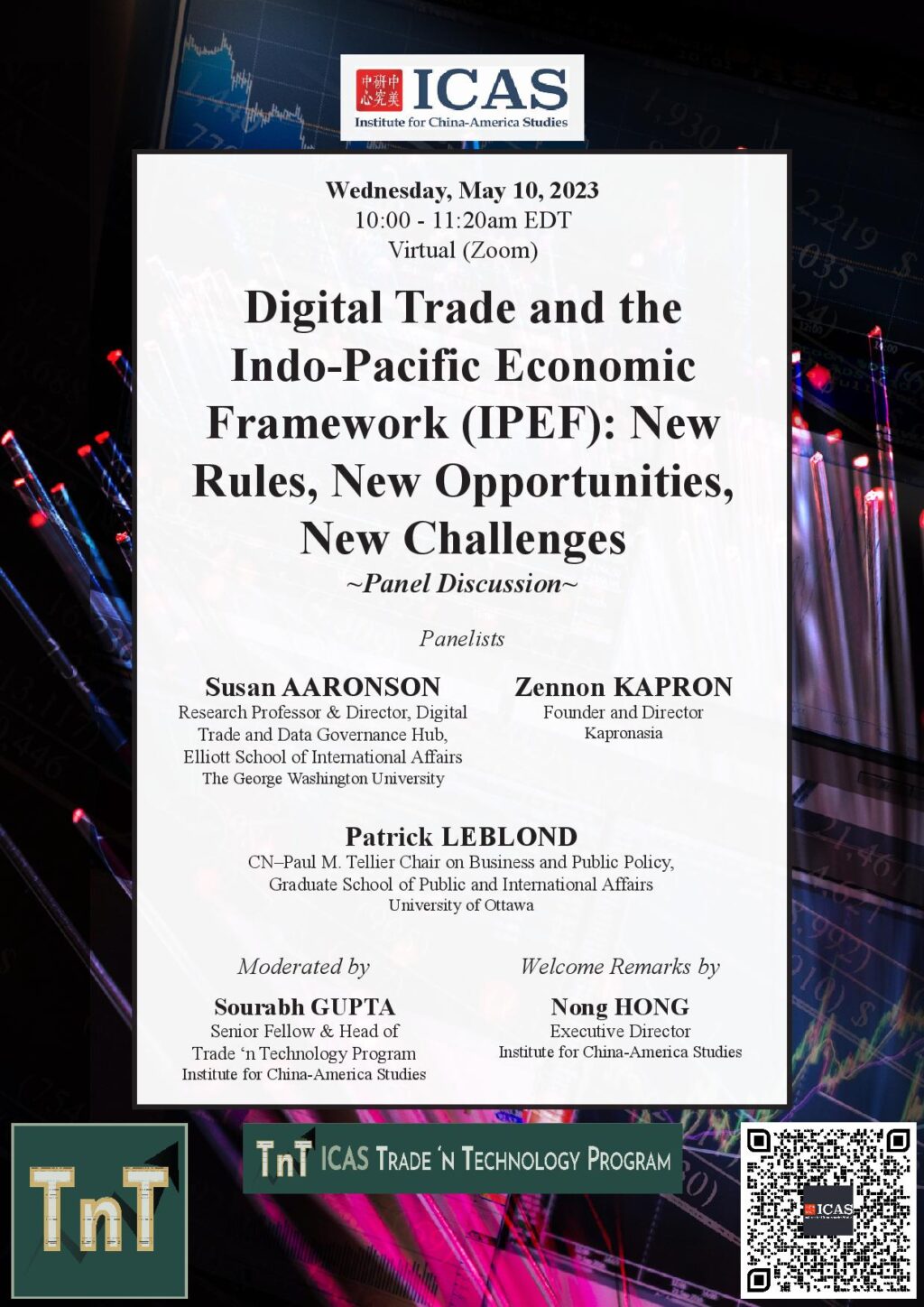
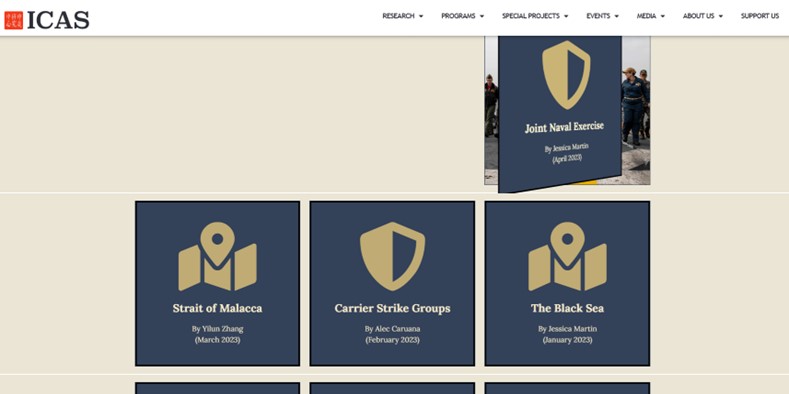
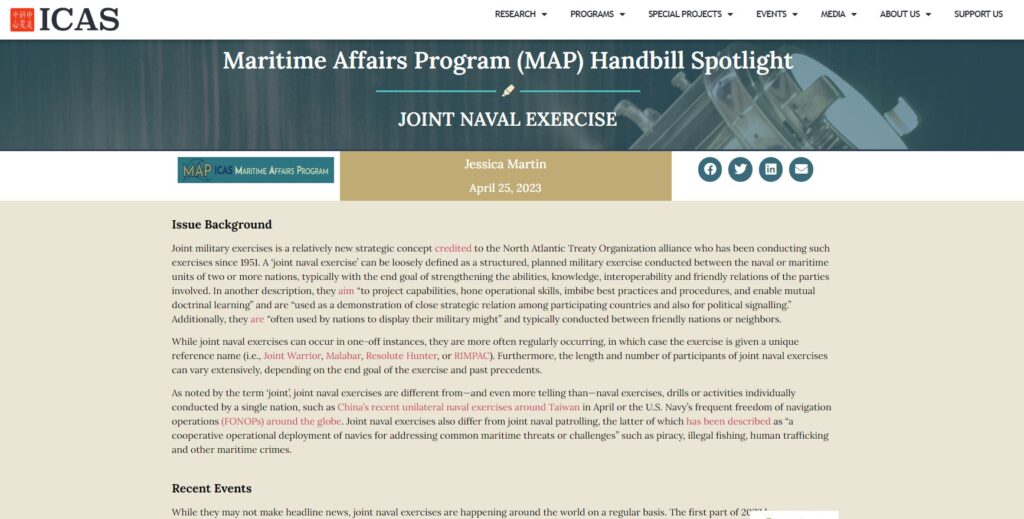
After a successful full year of production, the ICAS Maritime Affairs Program has now developed and released an archive for its Maritime Affairs Program Spotlight analyses in order to provide easier access and encourage sharing.
Maritime Affairs Program Spotlights are a short-form written background and analysis of a specific issue related to maritime affairs, which changes with each issue. The goal of the Spotlight is to help our readers quickly and accurately understand the basic background of a vital topic in maritime affairs and how that topic relates to ongoing developments today.
There is a new Spotlight released with each issue of the ICAS Maritime Affairs Program (MAP) Handbill – a regular newsletter released the last Tuesday of every month that highlights the major news stories, research products, analyses, and events occurring in or with regard to the global maritime domain during the past month.
2023 Spotlights So Far
Will the US Permit the ROK its Own Nuclear Deterrent?
By Capt. Sukjoon Yoon, ret.
April 25, 2023
The possibility of the ROK acquiring its own nuclear assets to counter the nuclear threat from North Korea is now being openly discussed in South Korea. Despite the US commitment to provide Extended Deterrence and to shelter the ROK under its nuclear umbrella, in recent polls more than 70% of South Koreans supported the development of an indigenous nuclear deterrence by the ROK.
There are, however, several serious obstacles to be overcome if the ROK is to acquire its own nuclear capability: it will likely be a very costly project; developing and testing nuclear weapons within the narrow geographical scope of the Korea Operational Theater will be very challenging, and perhaps would require US assistance; the development timeline is currently unclear; and there are legal and procedural issues regarding compliance with international agreements.
The ROK recognizes a potential nuclear threat from China in the longer term, but the immediate problem is the growing menace of North Korean nuclear and missile threats. There is a clear disparity between the conventional capabilities of the ROK-US alliance and North Korean nuclear capacities…
Notes & Thoughts on John Kerry’s Discussion with Foreign Policy on Climate Challenge
By Zhangchen Wang
May 5, 2023
On April 20, 2023, the U.S. Special Presidential Envoy for Climate, John Kerry, had a discussion with Foreign Policy regarding the climate policies of the United States and his thoughts on some recent trends. Their discussion covered a range of topics, including the Inflation Reduction Act (IRA), U.S.-China cooperation on climate change, and the upcoming 2023 United Nations Climate Change Conference (COP28).
What was Discussed in the Interview?
What Did We Learn from the Interview?
The Fight for Representation: The State of Chinese Americans Survey
Thursday, April 27, 2023
Institute for China-America Studies was very proud to be a supporting partner in this insightful, trail-blazing survey on the state of Chinese-Americans which culminated in a free, live webinar revealing the survey’s key findings and results on April 27, 2023! We thank the teams at Committee of 100 and Columbia University School of Social Work for their inspiring dedication to this project, which is only just beginning, and look forward to supporting future similar endeavors.
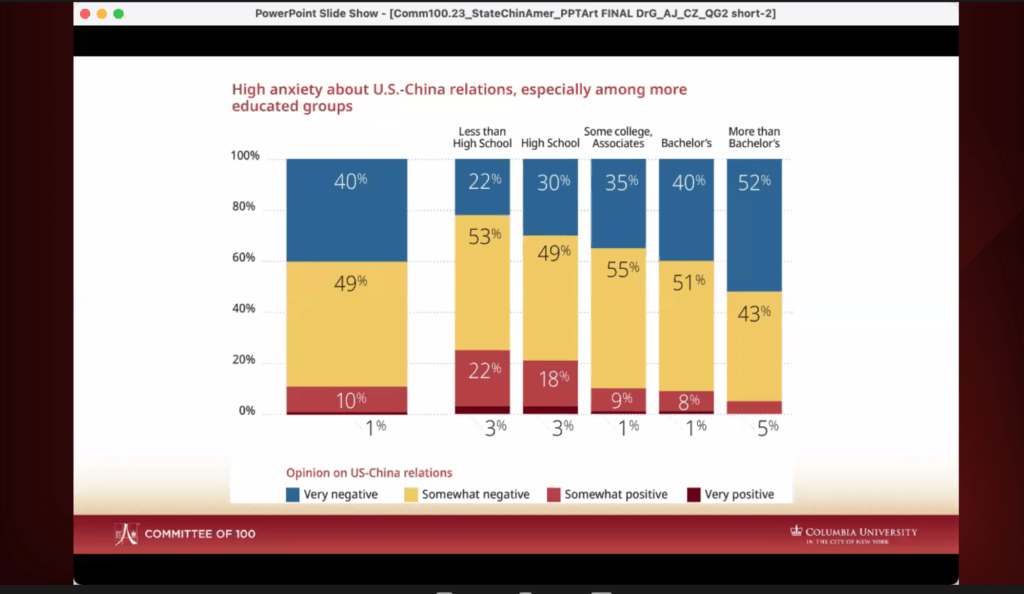
On Friday, May 5, 2023, Senior Fellow Sourabh Gupta discussed the macro-outlook for U.S.-China relations on CGTN America’s The Heat.
On Saturday, April 29, 2023, Senior Fellow Sourabh Gupta was quoted in the South China Morning Post on China’s peace brokership role in the Russia-Ukraine conflict
On Friday, April 28, 2023, Senior Fellow Sourabh Gupta discussed demographics with India’s growing population on CGTN’s The Point with Liu Xin.
On Friday, April 28, 2023, Senior Fellow Sourabh Gupta was quoted by a South China Morning Post article on China’s wolf warrior diplomats and diplomacy with France.
On Thursday, April 27, 2023, Senior Fellow Sourabh Gupta discussed Secretary Yellen’s new remarks and US-China economic engagement on CGTN’s Dialogue.
On Thursday, April 27, 2023, Senior Fellow Sourabh Gupta discussed US-South Korea relations and President Yoon’s state visit on CGTN’s World Insight with Tian Wei.
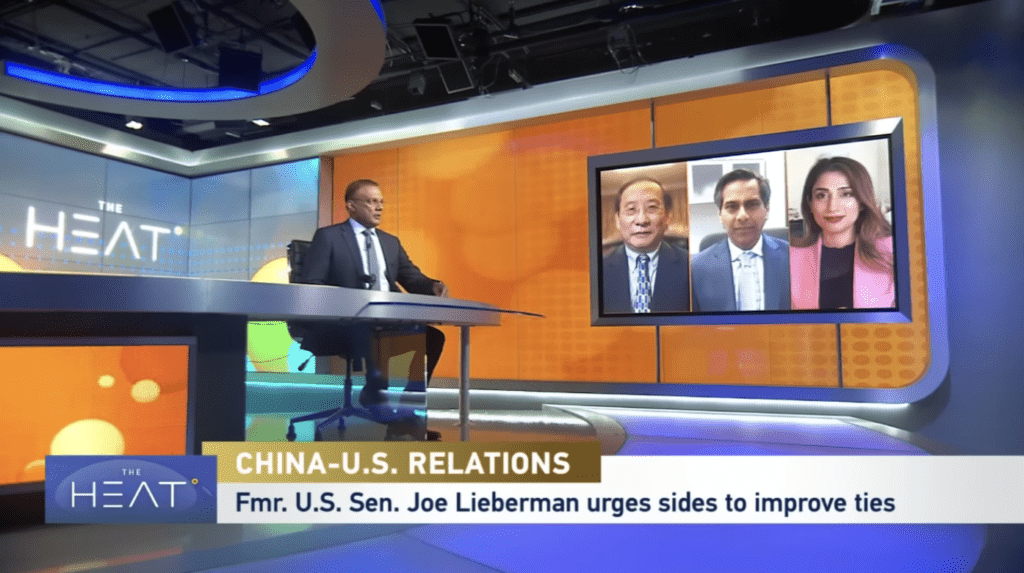
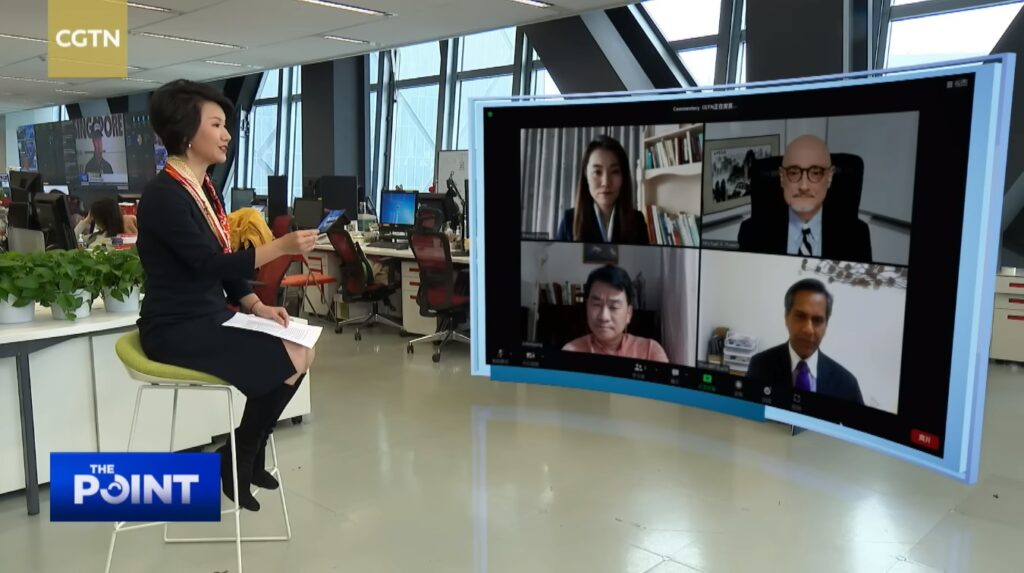
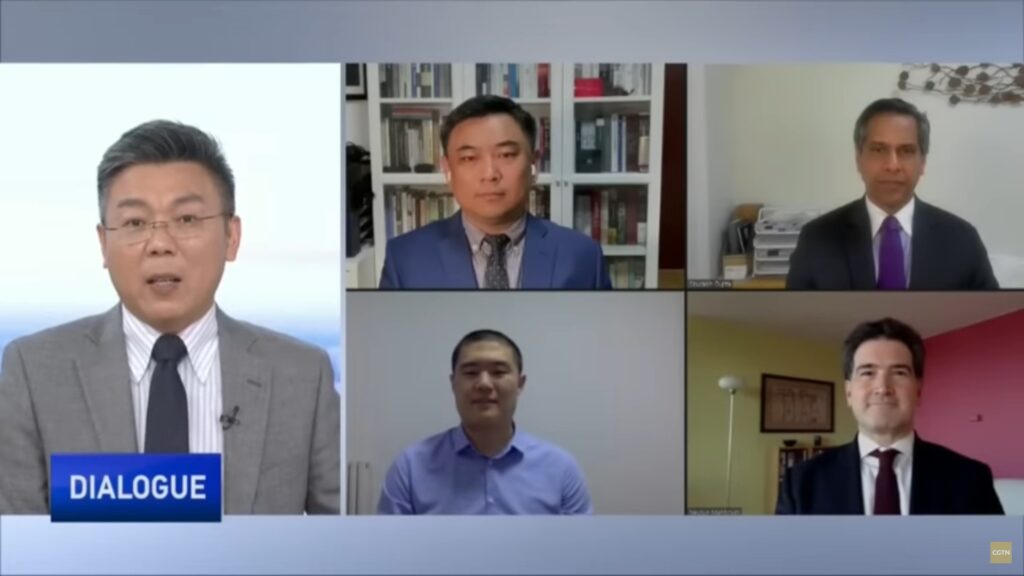
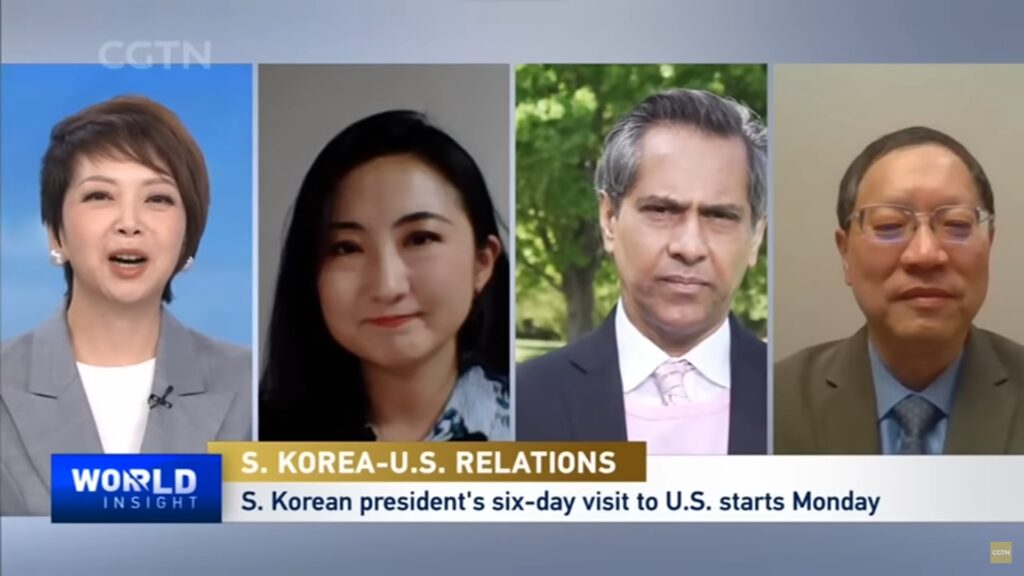

The Institute for China-America Studies is an independent nonprofit, nonpartisan research organization dedicated to strengthening the understanding of U.S.-China relations through expert analysis and practical policy solutions.
1919 M St. NW Suite 310,
Washington, DC 20036
icas@chinaus-icas.org
(202) 968-0595
© 2025 INSTITUTE FOR CHINA-AMERICA STUDIES. ALL RIGHTS RESERVED.